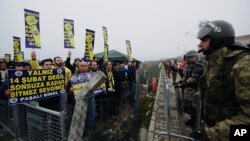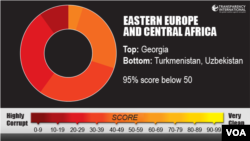ISTANBUL —
Turkey has in the past faced criticism for corruption, but the government claims it is committed to stamping it out.
Turkey in the last decade has enjoyed unprecedented growth under the ruling AK party, with the economy tripling in size. But the country continues to be dogged by corruption.
In 2011, the annual European Fraud Survey by the international accounting firm Ernst and Young found 77 percent of Turks interviewed thought bribery and corruption commonplace. The Association of Certified Fraud Examiners noted that the world average for fraud in organizations this year is calculated at 7 percent of total turnover; in Turkey, this figure is about 15 percent.
Turkey in the last decade has enjoyed unprecedented growth under the ruling AK party, with the economy tripling in size. But the country continues to be dogged by corruption.
In 2011, the annual European Fraud Survey by the international accounting firm Ernst and Young found 77 percent of Turks interviewed thought bribery and corruption commonplace. The Association of Certified Fraud Examiners noted that the world average for fraud in organizations this year is calculated at 7 percent of total turnover; in Turkey, this figure is about 15 percent.
Attila Yesilada, political analyst at Istanbul-based research firm Global Source Partners, says their studies indicate international investors are also facing the menace of corruption.
"More than half of foreign businesses in Turkey complain about bureaucracy, red tape, corruption, bribery and influence-peddling, all varieties (of) things that really distort the business environment. AKP has made tremendous efforts to reduce the problem, but it's not going away," he said.
The AK Party prides itself as pro-business and says it is committed to rooting out corruption. Earlier this year, the United Nations awarded Turkey a public service award in the field of anti-corruption. Police have carried out a series of anti-corruption raids against local municipalities. But critics point out the raids were only against those municipalities controlled by opposition parties.
Analyst Yesilada says many of the government actions have only resulted in a change of who benefits from corruption, rather than eliminating it. He says the key problem is the centralization of power in Turkey.
"I think most importantly as long as we have a mentality where the state and the bureaucrats are in a position to hand out licenses and have the ultimate decision on who owns what and who runs what in this economy, this situation will not change," he said.
In reforms introduced by the previous government in 2001, in cooperation with the World Bank, a series of independent regulatory bodies were created to investigate corrupt practices, especially within the state. But in 2010, the government put the regulators under state control.
The AK party disputes criticism of its record, pointing out that under its decade-long rule, Turkey has enjoyed unparalleled economic success.
"More than half of foreign businesses in Turkey complain about bureaucracy, red tape, corruption, bribery and influence-peddling, all varieties (of) things that really distort the business environment. AKP has made tremendous efforts to reduce the problem, but it's not going away," he said.
The AK Party prides itself as pro-business and says it is committed to rooting out corruption. Earlier this year, the United Nations awarded Turkey a public service award in the field of anti-corruption. Police have carried out a series of anti-corruption raids against local municipalities. But critics point out the raids were only against those municipalities controlled by opposition parties.
Analyst Yesilada says many of the government actions have only resulted in a change of who benefits from corruption, rather than eliminating it. He says the key problem is the centralization of power in Turkey.
"I think most importantly as long as we have a mentality where the state and the bureaucrats are in a position to hand out licenses and have the ultimate decision on who owns what and who runs what in this economy, this situation will not change," he said.
In reforms introduced by the previous government in 2001, in cooperation with the World Bank, a series of independent regulatory bodies were created to investigate corrupt practices, especially within the state. But in 2010, the government put the regulators under state control.
The AK party disputes criticism of its record, pointing out that under its decade-long rule, Turkey has enjoyed unparalleled economic success.






